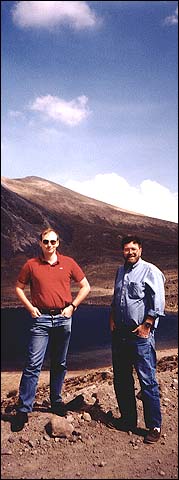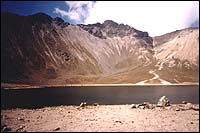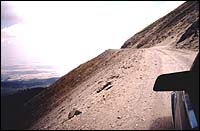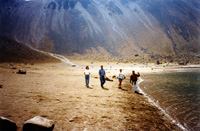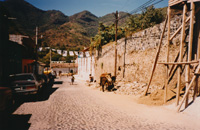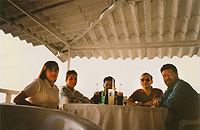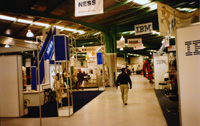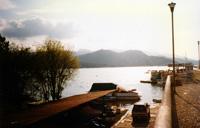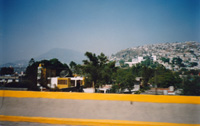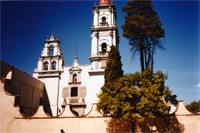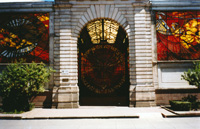|
Vaughan Family Timestream® Maps |
| Home Biography People Places Multimedia: Making It Work On the Water Writings/Presentations |
Tendencias en Multimedia

Presentation to the
Sexto Simposio Internacional de Sistemas Computacionales y Electrónicos
Instituto Technologico de Estudios Superiores de Monterrey,
Campus Toluca, Toluca, Edo. de Méx. C.P. 50252
Viernes 8 de noviembre, 1996, 16:30 hrs.
and to the
Universidad Autonoma de Nuevo Leon
Facultad de Contaduria Publica y Administracion
Sabado 9 de noviembre, 1996, 11:30 hrs.
When I wake up in the morning, I don't feel like an expert. In fact, probably like you, I worry about all the things that I don't know and the things that I must still learn. This is, I believe, a personal problem of self-discipline. More disciplined people, and I have met a few, go to bed early and then start their mornings feeling quite robustly expert and alive, standing tall and easily exhaling superior knowledge and confidence. I am not one of them.
Since I became interested in the information revolution and connected a high-bandwidth pipeline directly from my computer to the World Wide Web, I have become a child in a candy store. This is a store where undisciplined minds like mine are at great risk. A store where sometimes you will discover me at midnight, fat and full of sweet ideas and sticky information, sitting in a mess of opened bookmarks and URLs, staring drunkenly at a monitor while the engines of my brain attempt to process the many tastes and sugars of interesting input. This process, as you might imagine, leaves a wicked hangover.
Many of you have the keys to this candy store, too, and have perhaps suffered the same information hangover. In the next hour, we will explore the history and some of the architecture of this store. And we will investigate the importance of this seductive and intriguing warehouse.
But before we gather our keys and open the store, however, I would like to thank the organizers of the symposium for honoring me with an invitation to speak to you. And for honoring me as an expert, when, as I have described, I wake in the mornings not an expert and wishing desperately for my first cup of coffee. And I would thank McGraw-Hill, publishers of my book about multimedia, who honored me by translating my words and bringing them to you in Spanish as Todo el Poder de Multimedia. Mexico is a very exciting and industrious country with many bright and creative people who will add greatly to the information revolution.
What is the multimedia and information revolution?
It might please you to know that the United States, with its overwhelming size and economic power, does not OWN the information revolution. They may have fine, fast data highways and many sleek data transport vehicles that travel on the highways, but the revolution is really NOT about shiny vehicles and wide roads, it's about what's INSIDE the vehicles. It's about the stuff you can't see behind all the hype and the noises of change. It's about what's under the hood. It's about good content and excellent ideas.
Under this hood is where the profound changes that affect all of humankind are taking place. Where the ideas live. As one reader of my book wrote to me a few months ago:
"The multimedia and Internet revolution are a rare occurrence in human experience - a paradigm shift. We are lucky to be able to watch our concept of the universe around us change in a substantial way. This has only happened a handful of times throughout history and we should embrace and enjoy this change."
This information revolution is already a great global equalizer. The PLACE of an Internet address is completely irrelevant, whether it ends in (dot) .us or (dot) .mx. or (dot) .uk or (dot) .fi. It is the content and the ideas that you discover there that is important!
Speaking of (dot) .fi, for a few weeks in the year, I am a visiting professor at the Interactive Telecommunications Program of the Helsinki School of Economics and Business Administration in Finland. That's in "North Europe." Way north, with reindeer and polar bears. Well, the Finns are reportedly the largest users of the Internet (per capita in a 5-million population) in the world. More than the North Americans, per capita. It's a statistic that makes sense to me because they have long, dark, cold winters near the arctic circle, and they must get pretty bored with ice and snow piled up against the door - some places there, the sun never rises on a winter day. While nobody in the modern world has any "spare" time anymore, the Finns have captured some elusive "free" time, and many wander through the new "cyberspace," visiting other people's places around the world, and preparing their own home pages for reciprocal visits.
Perhaps one of you enterprising students could become rich by selling to these suffering people warm GIF and JPEG images and WAV files with the sound of breaking surf from Cancun, LaPaz, and Zihuataneneo. You could become the Sunny Sisters of Mercy while satisfying the laws of economics by providing high-demand goods.
My 23rd great-grandfather, Hugh DuPuy from France, followed a call from Pope Urban II, and went off on the First Crusade with Godfrey of Bouillon to defeat the Turks at Dorylaeum, Nicaea, and Antioch. In 1099, these guys conquered Jerusalem, and my great-grandfather became governor of Acre, a port city now a few kilometers north of Haifa in Israel. But nothing is permanent. In 1187, Saladin came back and defeated the Christians, and Acre was recaptured. It was pretty bloody. But Hugh had already returned to his castle in France in time to produce (luckily for me) three children with his wife, the lovely Devrard DePoisseu. In 1189, when Pope Clement III declared a Second Crusade, my 21st great-grandfather went back to the middle east with King Richard the Lion-Hearted of England, and they recaptured the Holy Lands again.
Paradigm shifts are not a new phenomenon in human history, just rare. Loosely viewed, the Crusades were the beginning of a paradigm shift: a time when most of Europe united in a common interest to indelibly stamp Christian beliefs onto the behavior patterns of the known world. By setting up the infrastructure to accomplish this and then pulling it off, the crusaders changed the concept of the universe around them in a substantial way.
The data highway that these ancestors used was mostly word-of-mouth with occasional letters written in Latin or Greek on animal skins or pressed bleached bark or sometimes clay tablets. Data packets galloped at horseback speed along muddy low-bandwidth paths. When a horse-and-rider occasionally stumbled off the cliffs and fell into the sea, mail was lost forever - this accident still happens today, when bits and bytes fall on the floor. Mostly, the information content carried along this highway was about political power, war, and taxes.
Then, about 300 years later, a few fellows in Italy and Germany invented the printing press and started distributing affordable books to regular people, or at least to the ones that could read. Gutenberg became the most famous because he localized Holy Bibles into easy-to-read languages, and they sold like hotcakes in a culture where religion was central to daily life. Like my great-grandfather in the Crusades, I am sure these industrious printers were unaware of the lasting impact of their actions. But they changed the fabric of society. Printing presses enabled an information-based paradigm shift, and changed the human universe in a substantial way.
Within a few years, a lot of people had read these Holy Bibles, and there were many philosophical disagreements. Indeed, by the early 1500's, Martin Luther and many others revolted from some of the Pope's ideas and from Catholicism, and a lot of people were stretched, burned, and otherwise tortured for their ideas during the Inquisition and the Reformation.
My 10th great-grandfather, Count Bartholomew DuPuy, worked for King Louis XIV in France. In 1685, King Louis declared that only Catholics could live in France, and any Protestants would have to give up their property, be tortured, or even be put to death. Count Bartholomew was a Protestant. He and his beautiful young bride, Susanne Levillain, were given a 15-day pardon by the king, and secretly escaped from their family home in Gabrielles with Susanne dressed up like a page boy to get past the guards. They went to Germany where (I am pleased to say) they made children. Then they went to Holland, then to England, and finally, in 1699, they took a ship to Virginia in the New World. In this way, my ancestors, and I am sure some of yours, suffered from the last great information paradigm shift in human history.
Well, today, in 1996, another great paradigm shift is underway, and multimedia is part of its core. Multimedia is the enabling methodology for the information revolution. It is the new medium for presenting ideas and content. It is the pictures, text, sounds, and motion video of modern communication.
Instead of printing presses, leather covers, paper, ink, and woodcuts, we have the Internet, CD-ROMs, laser writers, 200-megahertz Pentium processors, 32-bit audio boards, video digitizers, high-resolution color monitors, and Windows95. Instead of a few priceless books in our home library or thousands of books in a central repository many kilometers away, our information library is becoming richly limitless and accessible from anywhere by anyone.
Because of this technologically-driven universal availability of information, the way humans view the universe will change. Let us hope that we and our descendants can manage this change without the painful tumors of an Inquisition or a Reformation forming around power, money, control, or religious interests -- around the growing social and economic polarization of the technology "haves" and "have-nots."
These are exciting times. We have been given new tools for shaping the very nature of information and how it is accessed and presented. While we struggle to understand what to do with these tools, we are INVENTING the future.
When they explored the nature of electricity only nineteen decades ago, I am sure that Count Alessandro Volta, Andre Ampere, Georg Ohm, Charles Coulomb, Joseph Henry, and Heinrich Hertz would have been quite surprised to learn that their names and life's work would become tightly woven into the complex language of technology in our life today. In fact, I'm sure at least twelve Count Voltas smiled when they saw me drag out the long cables and jump start my car last week in the rain.
I would like to think that one of you, here in this room, may become the "Gutenberg" or the "Volta" of this information and multimedia revolution. It could happen for you! The revolution is starting now! All it takes is INVENTION!
And I know for a fact that my student friends from Mexico are as smart and as inventive and as industrious as my friends from Finland and France and Canada and Chile and California. But, on second thought, maybe nobody can be as industrious as the multimedia freaks in California, where all night long they eat Pizza and drink Coca-Cola, the essential vitamins that make people smart, in a pathological lifestyle while making multimedia in front of glowing monitors. Perhaps they will all die young, without children. But I came across an Internet services provider in Toluca, NetSp@ce, who already advertises Domino's Pizza on its home page. Perhaps I should warn my friends in San Francisco that you have learned the secret of multimedia and are on the way! Perhaps NetSpace is paid by Dominos with free pizzas, then delivers them to Web developers here! This needs investigation.
Adventuring on the data highway of today's information revolution is much like driving the road to the caldera at the top of your famous Nevado de Toluca. To reach this amazing peak more than 4000 meters above the sea, there is a narrow track cut into the side of the steep volcano by men and caterpillars, like the thin scar of a knife spiraling an orange. The journey is not without risk, but the known laws of gravity and good steering keep you from tumbling into infinite darkness. There is competition for bandwidth as you meet other vehicles, your tires rolling but millimeters from the abyss. The little white crosses by the side of the road tell you that others on this highway may not have been lucky. But you forge ahead anyway. Indeed, Bill Gates would tell you that success is often simply being at the right place at the right time with the right vehicle. You will never reach your goals unless you are prepared to make the journey. Of course, if you are like me, you may reach your goal only to discover that every muscle in your right leg is frozen, that your hand won't uncurl from the door handle, and that you are uncertain if your fast heart rate, quick breaths, and dizzyness are a function of too much adrenalin or too little oxygen.
Because stories from the past are good teaching tools, I should also warn you: Johan Gensfleisch Gutenberg, inventor of movable type and publisher of many Bibles, is said to have died in 1468, a penniless and poor man. So learn from history: be sure to arm yourself with a business plan, one that shows more profit than loss, before you jump into this multimedia and information revolution. Think ahead!
I should also caution you that this revolution will generate peculiar political aberrations before stabilizing: in Myanmar (a curious country formerly known as Burma) the maximum prison term for possessing an unauthorized modem is 15 years.
So, the important things to remember from this undisciplined and inexpert account of history and history-making are
Number 1: There are occasional BIG events in the evolution of human society called paradigm shifts.
Number 2: The just-now-beginning information revolution will give birth to a BIG paradigm shift.
Number 3: Today, we must INVENT the new methodologies for information management and presentation, teaching and learning, and entertainment.
Number 4: One of you could be remembered for a thousand years, even if you die penniless and poor.
Number 5: Pizza and Coca-Cola will make you smart.
Tendencias en Multimedia
Multimedia is any combination of text, graphic art, sound, animation, and video delivered to you by computer or other electronic means. It is richly-presented sensation. When you weave together the sensual elements of multimedia -- dazzling pictures and animations, engaging sounds, compelling video clips, and raw textual information -- you can electrify the thought and action centers of people's minds.
Multimedia requires large amounts of digital memory or bandwidth. Today, it is typically delivered on CD-ROM, which can hold about 650 megabytes of data, and can be mass produced from polycarbonate plastic for less than one dollar each. Or multimedia can flow across the Internet in data pipes large and small. The new Digital Video Discs (DVD) will reach the marketplace next year. They hold about 4.7 gigabytes of digital information. Supported by Toshiba, Matsushita, Sony, Philips, Time Warner, Pioneer, JVC, Hitachi, and Mitsubishi, this technology will supersede today's CD-ROMs.
More than 80 percent of all personal computers sold today include a CD-ROM player. In the United States, more than 39 million households have a computer. In 1995, 206 million CD-ROMs were sold worldwide.
Start counting to a million, incrementing by one every second: (One) (Two) (Three) in a minute you have counted to sixty; in an hour to 3,600. In 277.77 hours you will reach a million - that's 11.57 24-hour days of non-stop counting, no pizza, no beer. You will be dead before your reach your goal. A million of anything is mind-boggling.
According to some sources, there are about 52.8 million users of the Internet today. The number of users has doubled every year since 1988. In January of this year, there were about 9.5 million hostnames with IP addresses. In September, there were 611,860 three-letter domains registered with InterNIC, addresses ending with .com, .net, .org, .gov and .mil. The two-letter domains most commonly used outside of the U.S. have more than 5 million hosts, and among these 2-letter domains, Mexico ranks 31st, with about 21,000 hosts. Unlike on the old data highways, the information carried by the World Wide Web is not centered around political power, war, and taxes, but is broadly universal, appealing to individual and personal needs.
Like it or not, one of your keys to the candy store must be a good understanding of English. The Globe and Mail, a Canadian newspaper, reported last month from a British Council study that one BILLION people will speak English by the year 2000 as a first, second or "foreign language." That's one thousand times one million. English is the official or joint official language of more than 75 countries. Algeria recently dumped French in favor of English as the second language in schools. More than two-thirds of the world's scientists read English, and three-quarters of the world's mail is written in English. 80 percent of the world's information that is stored on computers is in English.
Every year, in the middle of summer, one of my colleagues has a birthday party at the beach. Her friends, a great many of them well-known San Francisco Bay Area multimedia developers and pundits, assemble picnic chests, volleyballs, children, suntan lotion, dogs, and watermelons for an afternoon around a circle of hot and smoky charcoal grills.
During the party of 1994, they talked about their latest multimedia ventures while we turned chicken breasts, salmon, and barbecue meat; the buzz was about getting CD-ROM titles and products into the retail sales channel.
But shadows fell on the CD-ROM marketplace later that year, and the channels grew muddy and expensive -- many multimedia developers were badly hurt in the Christmas shake-out. In 1994, more than 2000 new CD-ROM titles competed for the 300 or so spaces on a retail store shelf. You can't sell a product if nobody can find it in the store. Some went broke.
When those same good developers gathered at the grills in the summer of 1995, the undertow of conversation was about HTML, Java, and migration to the growing World Wide Web. This was a new challenge, a new gold rush, and that channel needed multimedia!
It now costs well over a million dollars to design and produce a successful consumer multimedia game on CD-ROM; the shake-out survivors are large companies like Warner, Virgin, Broderbund, and Electronic Arts who follow the high-stakes "hits" model: one winning title will make up for two losers. And the dollars are measured in seven figures. A complex Web site can cost tens of thousands of dollars in graphic art, custome database programming, and HTML implementation.
There are today, of course, technological trends and engineering feats and software that daily improve the delivery of multimedia or increase the bandwidth of the network. These efforts are straightforward attempts to solve tangible problems, driven by the immutable laws of physics. Their execution is essential to the information paradigm shift.
Challenges and the Candy
But the REAL challenge today, as I said earlier, is to create multimedia experiences where content is so well organized, so germane and correct and effectively presented, that visitors come away from the encounter augmented and better than they were going in. This is an intangible problem. A problem difficult to bring into focus.
This challenge brings us back to the candy store, where I described to you powerful mixes of words and sounds and video that satisfy our needs and desires. Where we sit in a corner exhausted and fulfilled after an incredible multimedia experience.
Well, it just doesn't work that way. The multimedia candy store is a myth, and today its shelves are mostly full of junk - basura. You tried a CD-ROM game and were bored within five minutes. You gagged at the stupid education title about Whales. You wasted 45 minutes on the Web, and you never did find out why they add lead to glass crystal. The computer you bought for your son did not improve his grades.
If you bought an automobile in 1896, it might not crank up in the rain; you could always dry off the magneto and tweak the carburetor. In 1996, your Mercedes Benz starts every time and, if it didn't, you wouldn't open the hood and adjust fuel injectors or the electronic ignition computer without special knowledge and tools. A hundred years of knowledge have gone into make driving your car a satisfying experience.
In the same way, the information revolution is just too new. We do not have a hundred years of experience engineering good content. In fact, the basic rules and laws for making excellent multimedia have not been discovered. The methods have not been INVENTED yet. We don't know for certain what colors work best together in what situations, or exactly when to use a sound byte, or the best way to involve a viewer so deeply in our material that he weeps. We don't have the formulas.
But tens of thousands of people around the world are learning to make multimedia and they are testing recipes. They are experimenting with the candy and the tools. A few of them, I hope, perhaps even one of you, will contribute to this great paradigm shift and change the universe in a substantial way.
This is where multimedia is today.
Thanks very much.
Tay Vaughan es presidente de Timestream, Inc., una compañia que desarrolla software multimedia para CD-ROM e Internet. Dentro de la industria se le reconoce como uno de los pioneros del desarrollo multimedia. Vaughan ha desarrollado y administrado proyectos para clientes tan importantes como Apple, Kodak, Lotus, Marcromedia, Microsoft, NEC, Novell, Sun, Tandy y muchos otros. Además, ofrece conferencias en diversos foros en los Estados Unidos, América Latina, Europa y la Cuenca del Pacifico. Es autor de various libros didácticos sobre multimedia, entre los que se incluyen: "Multimedia: Making It Work" (1993, 1994, 1996, Osborne/McGraw-Hill - en español: "Todo el Poder de Multimedia") y "Using HyperCard" (Que). Vaughan es también profesor invitado en el Programa de Telecomunicationes Interactivas de la Esquela de Administración y Economía de Helsinki. Es miembro de reconocidos institutos y sociedades muy reconocidas, entre las que destacan: el Instiuto de Ingenieros Eléctricos y Electrónicos (IEEE por sus siglas en Inglés), La Sociedad de Arquitectos Navales e Ingenieros Marinos, La Sociedad Americana de Arquitectos Navales, etc. En 1987 fue nombrado miembro honorario vitalicio de la Asociación de prensa computatcional (The Computer Press Association). Tay Vaughan es Oficial de marina mercante con licencia, Piloto privado y posee una patente de téchnicas de monitoreo remoto.
